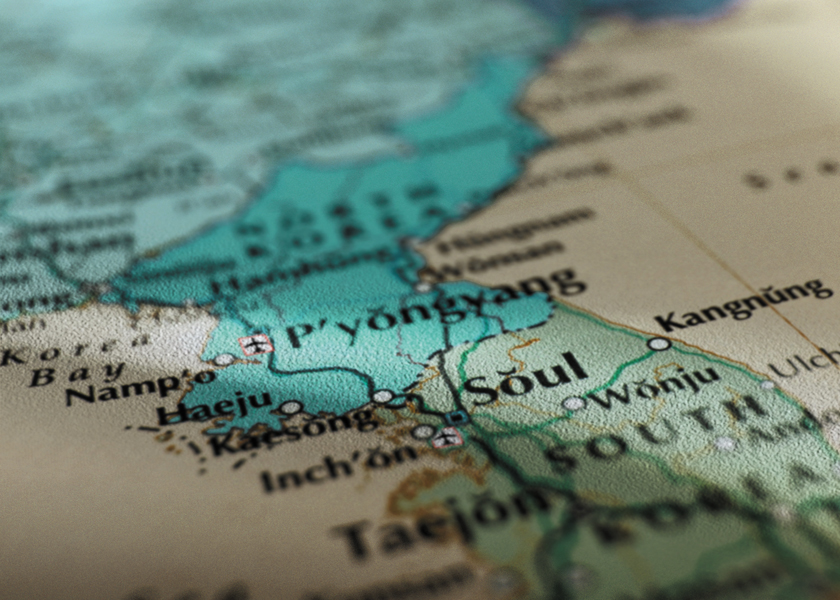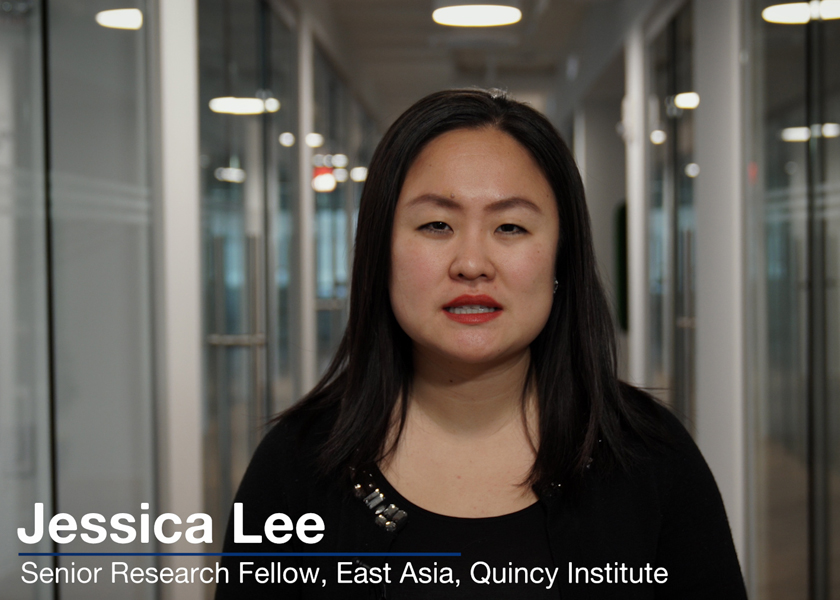Experts put their ideas on the table on forging a durable peace with North Korea | By Martha Vickery (Summer 2020 issue)

Reasons to pursue a peace treaty was the forward-thinking theme of a webinar held July 27, entitled Ending 70 Years of War: A Roundtable on Advancing Peace in Korea.
The date for the Zoom/Facebook Live event was intentionally chosen because it was the 67th anniversary of the signing of the armistice agreement halting hostilities in the Korean War. Representatives of the North Korea military, the U.S. military and the Chinese military signed the pact on July 27, 1953. The agreement has stopped the fighting, but not restored peace or normal diplomatic relations with North Korea, to this date.
The roundtable was sponsored by both progressive and conservative organizations, and the participants were Korea policy experts with diverse skills and perspectives, including academics, research analysts, a media commentator, and a military leader.
“A peace agreement will drastically improve the day-to-day life of North Korean people,” said activist Christine Ahn, co-founder of Women Cross DMZ, in a pre-discussion video in which voices of many proponents chimed in about what a formal end to the Korean War could do. Women Cross DMZ, which advocates and educates about the need for a U.S.-North Korea peace treaty, and about the need to have women involved in the peace process, was a co-sponsor of the webinar.
The Quincy Institute for Responsible Statecraft, which board chair Suzanne DiMaggio described as a policy and diplomacy institute that favors a move “away from endless war and towards vigorous diplomacy in pursuit of international peace” was a cosponsor. The publication The American Conservative also cosponsored, and executive editor Kelley Viahos, explained that the publication came into being as a way for its founders to write in opposition to the 2003 Iraq War. It has been consistently critical of policies that use military solutions “and the idea that we must impose our views on everyone to keep the world safe.”
In the video, Ahn said that Women Cross DMZ (and its national coalition, the Korea Peace Now! Campaign) believes that that peace is the precondition for denuclearization and improved human rights, not the other way around.” She noted that successive U.S. presidents have been swayed by the military industrial complex to demand denuclearization before any offer of peace and concessions on the part of the U.S.
Korea Peace Now will issue a policy report this fall showing that the status quo on North Korea, regardless of what president advanced it, has repeatedly failed. The economic costs of endless war are also a concern for Women Cross DMZ, Ahn added. Americans are weary of spending trillions of U.S. taxpayer dollars on waging endless wars, she said, “Now, more than ever, it is imperative that we invest in these things: Health care, housing, education, and the environment, so that we can have true human security.”
Will a U.S. resolution help?
Congressman Ro Khanna (D-CA) also made a short appearance in the introduction because he has introduced Resolution 152, which was passed in the House of Representatives, that would resolve to formally end the armistice and bring peace. Khanna explained the rationale: “If the U.S. moves first, if we have a peace declaration, then I think we will incentivize Kim Jong Un to take actual steps towards denuclearization” he said. “We increase the possibility for leaders on the Korean peninsula to take action and then we need to have real negotiation.”
Khanna said as soon as pandemic restictions lessen, he is planning an official visit to Korea with Rep. Andy Biggs (R-AZ) for the purpose of consensus-building around his ideas for a diplomatic approach to U.S.-North Korea relations.
Khanna predicted that, if presidential candidate Joe Biden wins the election in November, he will open up peace negotiations with the help of South Korean President Jae-In Moon. “Obama never had Moon as a partner, and now there is that partner.”
Panelist Douglas Bandow, writer, commentator, and senior fellow of the conservative Cato Institute, said that President Trump deserves credit “for at least being willing to engage the North. This is something that no policymaker wanted to do.” There have been serious consequences to not keeping diplomatic lines of communication open with other countries, he said. “The idea of a liaison office, of having some level of diplomatic recognition,” is important to reestablish, he said. “The more dangerous the situation, the more we need that communication.”
Armistice – a flimsy paper
Discussion moderator Katharine H.S, Moon, a professor of political science, and chair of Asian Studies at Wellesley College introduced the panelists: Lt. Col. Daniel Davis, a military expert for Defense Priorities; Henri Ferron, a fellow of the Center for International Policy; Jessica Lee, a senior research fellow in the East Asia program with Quincy Institute; Adam Mount, a director of the Defense Posture Project at the Federation of American Scientists; and Hazel Smith, a research associate in Korean Studies at the University of London.
Moon emphasized that the long-standing status quo of armistice “has given us a false sense of stability and security,” she said which is actually “a costly state of simply non-combat, where a lot of economic development has been allowed to take place in the south, and where human lives have deteriorated more in the North. So, it is not our answer, and today we will hear from people who will not only pose questions but also will lead us in a path toward some clearer answers toward true peace.”
Daniel Davis said that he has had experience working in a military capacity in South Korea. “The best thing for American national security is to work towards peace, because an absence of peace means that we need to continue to put billions every year into our alliance with South Korea, and troops in Japan. All those things are due to an absence of a peace agreement.”

How an old war is still real, especially for Koreans
Jessica Lee said to many, the Korean War is an abstraction because it happened in the distant past. To her family, and other Korean American families, it was alive in their immigrant parents. Lee recalled, “My father often reminds me that growing up, his family had nothing, so they actually made pants out of rice bags. To this day, he never eats potatoes,” she said, because it was all her grandparents could afford in the very tough post-war years. “So, I carry these stories with me and I think it is a stark reminder that it’s actually a war that has continued on all these years.”
Lee said she has followed the debates on the National Defense Authorization Act, particularly language assuming that U.S. troops will remain in South Korea. “There seems to be this preference for indefinitely prolonging U.S. presence there,” she said. The assumption itself needs to be questioned, and not simply accepted as a situation that will persist into the future, she said.
Human rights improve when economies improve
Hazel Smith, a British academic researcher who has been working on human rights issues in North Korea for 30 years, said having a bipartisan forum is a step forward in itself. The idea of a peace treaty is worth pursuing, Smith said, because it is a limited and therefore achievable aim.
In a peace treaty, the nations who are parties to it must agree to not try to interfere with the internal workings of the other state, which would include non-interference in human rights issues. “There could not be caveats on human rights concerns,” she said, “but there could be major advantages in terms of human rights.” As a result of normal diplomatic relations, North Korea would have foreign investment. In order to do that, she pointed out, “there would have to be guarantees —- property rights, a new legislative system in which businesses, and more crucially, individuals, had rights against the state.” That kind of evolution happened organically in China when its economy opened up, chiefly in response to the needs of foreign businesses and individuals. With that, she added, older types of strict state controls disintegrated over time.
Adam Mount remarked that any future overtures to North Korea must work on a model that rejects the idea that pressuring the regime will force disarmament. In fact, the opposite is true, Mount said. To build an environment for talking about peace, a secure environment must be established on the peninsula. North Korea has been driven by pressure to “expand its nuclear arsenal, and to build a clandestine procurement network to continue to fund their activities.” These activities are harmful to the long-term stability for the U.S., South Korea and North Korea, he said.
Less is more with a peace treaty
Henri Feron, an expert in peace and alliance treaties, said basic, agreed-upon principles need to be established for the two Koreas to sit down together. “Does peace require reunification or just recognition of the other state as a sovereign state? Those are questions that can make or break peace talks,” he remarked. “Negotiations with two Koreas broke down over that in Geneva in 1954.”
To be effective, any peace agreement must be a first step, not a “grand bargain to resolve everything,” Feron said. The foundation of an agreement has been set in prior peace talks, he added. “There is a path to reconciliation, and a peace agreement is part of that. They need the participation of the United States in order to effectively create foundations for progress in that area.”
The how-tos
Trying to extract grand bargain promises from North Korea, such as denuclearization, could change the nature of the agreement entirely, setting it up as more of a surrender treaty than a peace treaty. “The first step is to establish non-violence and a way to resolve other outstanding issues,” he said.
In response to a question during the discussion period, Lee said that “to disentangle the diplomatic complications of the war from other aspects of bilateral relations, a strong democratic-minded countries, we can begin to forge a new relationship, one that isn’t driven so much by threat calculus, but something that is more wholistic, perhaps with much more focus on trade, people-to-people diplomacy, and other aspects of statecraft that we haven’t really seen in recent years, because of our hyperfixation on the military.”
More about the work of Women Cross DMZ is at its website: www.womencrossdmz.org. The Quincy Institute is at: www.quincyinst.org and The American Conservative website is at: www.theamericanconservative.com


